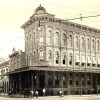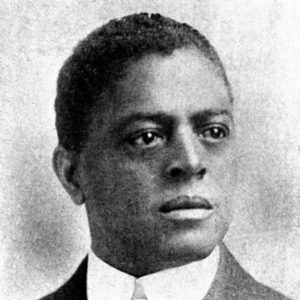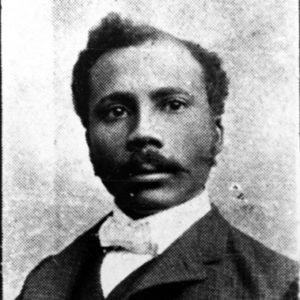calsfoundation@cals.org
J. H. McConico (1877–1958)
aka: John Hamilton McConico
John Hamilton McConico was an African American educator, newspaper editor and publisher, businessman, national grand auditor for the Mosaic Templars of America, and a civil rights pioneer. His business and civil rights leadership included membership in the National Negro Business League, National Association for the Advancement of Colored People (NAACP), and the Arkansas Negro Democratic Association.
J. H. McConico was born on December 25, 1877, in Livingston, Alabama, to Jessie McConico, who was a preacher, and Mattie McConico. His sister, Fannie, was four years his senior. After McConico completed the available public school courses, his family sent him to Agricultural and Mechanical College in Normal, Alabama. In 1898, McConico graduated from the department of printing with a literary emphasis. After graduation, he worked for the Atlanta Appeal newspaper in Atlanta, Georgia. In 1899, he returned to Livingston and founded the Advance, a Republican newspaper. A year later, he joined the faculty of his alma mater, rising to principal of the Department of Mechanical Arts.
In September 1901, Joseph A. Booker, president of Arkansas Baptist College in Little Rock (Pulaski County), invited McConico to join its faculty. While at Arkansas Baptist College, McConico bought a half interest in the Little Rock Reporter and co-published the paper, first with William A. Singfield and later with Charles P. King.
In April 1904, McConico became an assistant cashier and teller for the new Capital City Savings Bank of Little Rock. During his time at the bank, he was elected secretary of the National Negro Bankers Association. The bank’s credibility rested on the shoulders of its president, Mifflin W. Gibbs. When the bank collapsed in 1908 due to mismanagement, Gibbs was arrested and his reputation sullied. McConico’s prospects diminished, and his mood was melancholy. However, according to one contemporary biography, “his self-confidence never deserted him,” and McConico took a management position with the Arkansas Mutual Insurance Company.
On May 19, 1904, McConico married Mattie Keith. They had two daughters.
By 1910, McConico had begun his long career with the Mosaic Templars of America, a Little Rock–based African American fraternal organization and insurance provider with thousands of members in twenty-six states, Central America, and the Caribbean. In 1913, he was present when William Alexander, national grand master for the Mosaic Templars, was assassinated in Frankfort, Kentucky, by the disgruntled former Kentucky grand master, M. H. Harrison. McConico, who was also the assassin’s target, fought and disarmed him. By 1918, McConico was serving as the national auditor for the Mosaic Templars, a position he held until the organization went into receivership in 1930.
McConico’s business career and philosophy were inextricably connected with Booker T. Washington’s National Negro Business League (NNBL). McConico’s 1906 speech before the league in Atlanta, “The Negro Banker and His Struggles,” was published in the Colored American Magazine. In 1907, he published “The Negro’s Relation to Finance” in E. M. Wood’s Blue Book of Little Rock and Argenta, Arkansas. He addressed the league again in 1914. In these speeches and essays, he exalted the league’s principles of racial uplift through a successful, but separate, Black economy.
McConico became active in the early civil rights movement. In 1918, he became the first president of the Little Rock Branch of the NAACP. That year, as World War I raged in Europe, labor was scarce and cotton prices were rising, but planters refused to increase wages for Black workers even as higher-paying jobs became available. To force Black workers back into the fields and into positions as low-paid domestics, communities such as Pine Bluff (Jefferson County) passed “work or fight” laws. On Mosaic Templars letterhead, McConico reported to the NAACP’s New York office that it was “simply the old story of white people not being able to adjust themselves to the new order of things.”
In 1924, McConico was a delegate to the Chicago, Illinois, meeting of the Lincoln Club, an organization protesting the exclusion of Black people from Arkansas’s Republican Convention.
In 1942, McConico gained national attention as secretary of the Arkansas Negro Democratic Association (ANDA) when he was denied a ballot in the Democratic preferential primary. McConico said the ANDA was “not asking pity or any special favors, we are simply seeking to exercise those rights and privileges guaranteed to free men in a free country.” The July 1944 primary went much differently. After a ruling by the U.S. Supreme Court that declared white-only primaries unconstitutional, the state Democratic Party threw out its whites-only policy. The party did pass rules for a “loyalty oath,” designed to disqualify African Americans who had been Republicans, but they did not go into effect until January 1946. According to the New York Times, McConico was “one of the first to appear at the polls.”
McConico died on January 7, 1958, and is buried at Haven of Rest Cemetery in Little Rock.
For additional information:
Bush, A. E., and P. L. Dorman, eds. History of the Mosaic Templars of America: Its Founders and Officials. Little Rock: Central Printing Co., 1924.
Kirk, John. Redefining the Color Line: Black Activism in Little Rock, Arkansas, 1940–1970. Gainesville: University Press of Florida, 2002.
Woods, E. M. Blue Book of Little Rock and Argenta, Arkansas. Little Rock: Central Printing Co., 1907.
Blake Wintory
Mosaic Templars Cultural Center
 Banking
Banking Civil Rights and Social Change
Civil Rights and Social Change Early Twentieth Century, 1901 through 1940
Early Twentieth Century, 1901 through 1940 Mass Media
Mass Media J. H. McConico
J. H. McConico  William Singfield
William Singfield 




Comments
No comments on this entry yet.